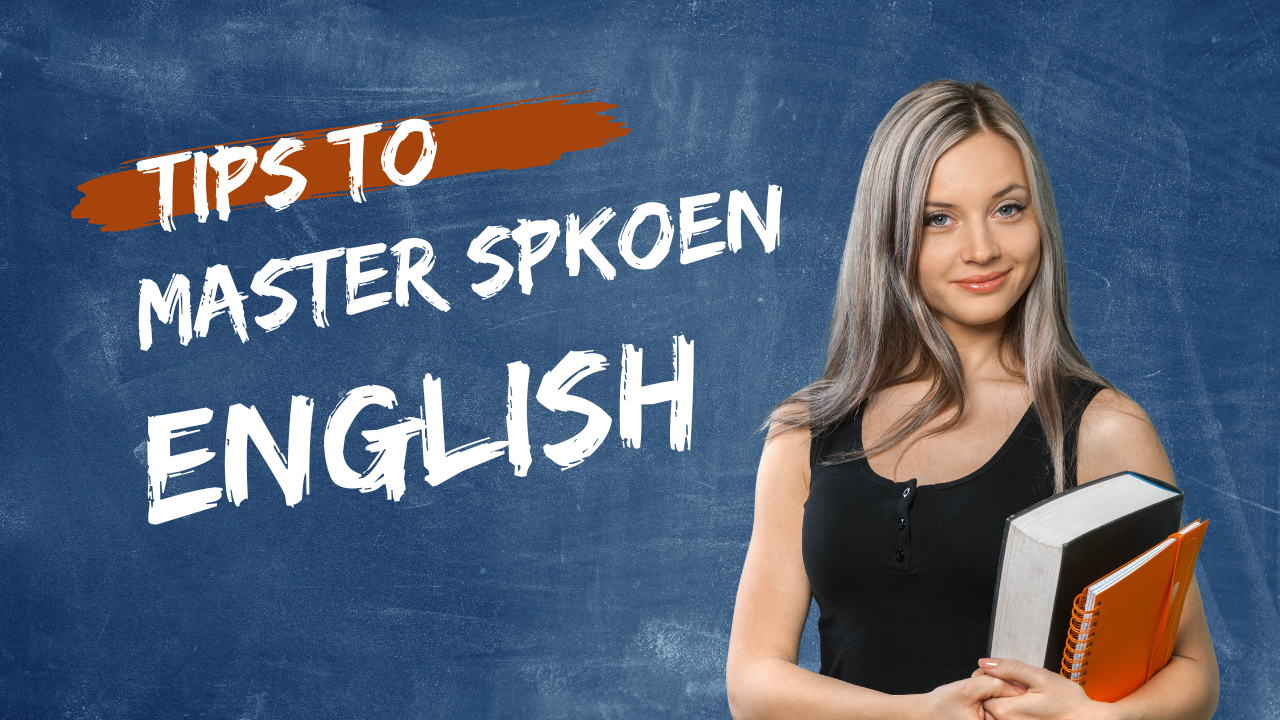How to master spoken English: Important tips
Mastering spoken English is a task that holds utter importance today. Many factors add to the
language’s importance, such as, English being a global language, used widely for communication, it is
also the “language of the internet”. English is also used for business transactions across borders and
is therefore important.
If a learner sets their mind to it, learning English is quite easy. Being fluent in English does not equate
to being perfect. Fluency is only a prerequisite to making your words easily understood and your
meaning conveyed as intended. Being at ease with the language is not difficult. With some insightful
tips to enhance your spoken English skills, you will be golden!
Tips to master spoken english language
1. Use Idioms correctly
Idioms are simply creative expressions, phrases particularly that help express intended meaning
indirectly. Phrases can have a literal meaning or an intended one. An example of an idiom may be
the phrase, ‘Don’t beat around the bush’. This simply means that speak clearly or stop avoiding a
topic you are uncomfortable with.
Idioms are frequently used by native speakers in their conversations and mastering this art will
surely help take a step toward fluency. Plus, idioms are fun and interesting to learn. Learn the most
popular idioms. After this is accomplished, understand which idioms to use in what context.
According to the country you are in, for example, America or the UK, you must alter certain idioms.
2. Engage in conversation
You must speak with your acquaintances in English because to become fluent, practice is a must. If
you live in a country where English is not commonly spoken, you can find ways to communicate with
a native speaker via e-sources, you can join one-on-one tuitions offered by organizations such as
Digiwiz. Such a step will help you get expert advice and will give you much-needed exposure. You
may also attend seminars and webinars and openly ask questions to test your skills and enhance
your knowledge.
3. Value Exposure
Conversation in English must be complemented with increased exposure. You can start by changing
the default language on your phone to English. You can listen to English music, read the news, and
watch TV shows and movies. You may also want to make it a habit to maintain an English language
journal. This method of exposing yourself to multiple mediums of English can help speed up your
progress.
4. Work on your vocabulary
You need to have a good enough vocabulary if you wish to speak fluently in English. The English
vocabulary is very vast and knowing the majority of the words should not be your focus. Instead, you
can focus on knowing basic words and understanding when and how to use them. Instead of using
certain repetitive words like “very” or “really”, you can use an exact word to convey your intention.
For instance, saying “It is exquisite” instead of saying “It is very beautiful”.
5. Learn phrases
Learning frequently used words is good practice for beginners but to be fluent, you need to master
speaking full sentences. Putting together all the words you’ve learned to speak coherently is a rather
taxing task. Instead, learn common phrases which consist of varied words. For instance, instead of
just learning the word “hectic”, it may be better to learn the phrase, “Tomorrow’s schedule is
hectic”. This helps the learner to understand the contexts in which the word is used. Slowly they may
also come across variations of the phrase and therefore learn new ways of expression.
6. Use technological tools
Multiple sources on the internet can help beginners master English fluency. Watching informative
videos on YouTube is one such way. Learning via YouTube enables you to do things at your own
pace. If you are however looking for a more interactive and detailed way of online learning, you
must use services provided by organizations such as Digiwiz. The organization offers a ‘Spoken
English’ course. The course provides grammar and vocabulary training, pre-recorded video sessions,
mock tests, tone improvement exercises, speaking practice, and a certificate of completion. The best
part is that the course is for all English speakers: from beginners to advanced learners.
7. Polish Pronunciation
Pronunciation is key if you want to be understood by others. This does not mean you have to drop
your accent and sound exactly like native English speakers. You just need to have understandable
pronunciation. Learn about phonemes, learn some tongue twisters, listen to podcasts, record
yourself while speaking, pick out common errors, and work on them.
8. Incorporate Slangs
Slangs are an important part of any conversational language. Having good knowledge of these is a
mark of fluency. Slangs vary from country to country and they also keep changing quickly.
Understand some basic slang and its locational variations. Some common slangs are also used while
using social media platforms which are rather informal but very current. Spend time on such
platforms and find amusing ways of conversation.
9. Grammar must not be the entire focus
Rules of grammar although important, when it comes to spoken English, tend to be quite flexible.
Most individuals bend grammar rules while speaking. Learning the grammar basics is crucial but
don’t jump into its depth too soon. First practice and speak understandably. If you later develop an
interest, you can engage in a detailed study.
10. Engage in fun activities
Learning does not have to be so serious. Spoken English is used in every context so you can try out other fun activities to learn it. One unique idea is learning new English songs and singing them. A lot
of music consists of word plays, rhymes, and whatnot. Reading lyrics, understanding them, and then
memorizing songs will end up automatically improving your command of English. You can also take
up hobbies or activities that involve spoken English: such as an acting gig, or a language club of some
sort. You can organize fun activities like crossword solving, or a language-themed game night. The
easiest of all, you can play online language games that are fun and yet, informative.


